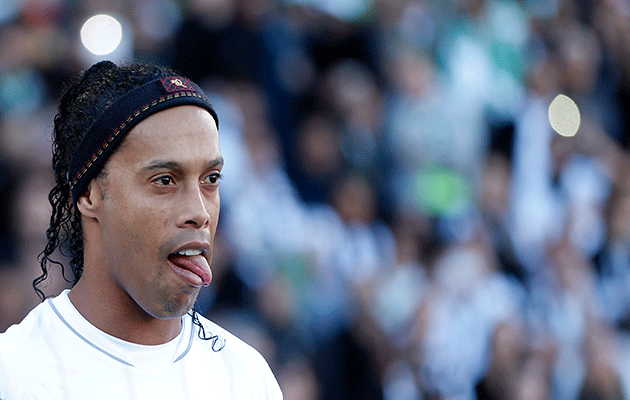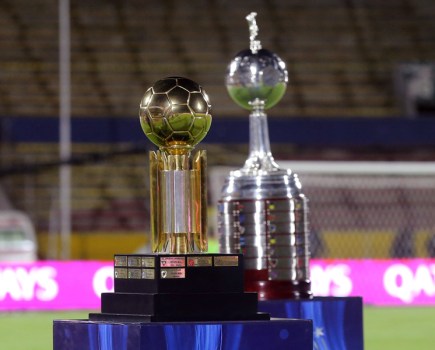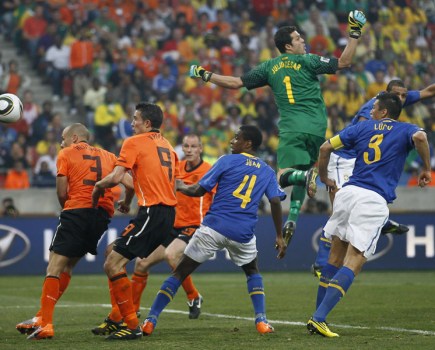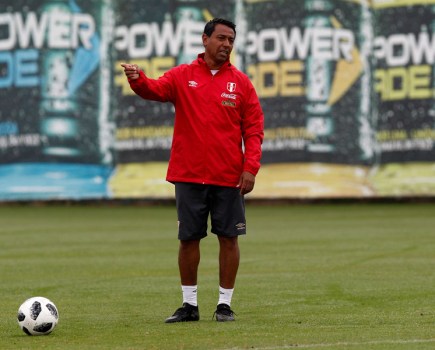The last 9 years of Ronaldinho Gaucho’s professional life were nearly summed up in his first 90 minutes for his latest club.
The former FIFA player of the year had been presented to fans of Fluminense of Rio at a previous game a fortnight earlier. A big crowd had come out for the occasion, and, inspired, Ronaldinho declared himself raring to go, desperate to get out there on the field. He neglected to add that it would be some 8 days before he actually turned up for training – part of the deal he agreed with the club was that he would straight away be granted two weeks holiday. Since he had not been in action since the end of May (with Queretaro in Mexico) this in itself was an eye opener, yet more evidence that getting the most out of his extraordinary talent is not at the top of his list of priorities – which would seem to have been the case for some time.
In hindsight it is almost tragically comic that going into the 2006 World Cup, the Brazilian media was full of speculation that this would be the tournament where Ronaldinho would prove himself better than Pele. It now seems evident that at that point the world had already seen the best of a player who had only just turned 26. In the subsequent nine years – the entire course of some careers – he has been a pale and immobile shadow of the joyful youngster who thrilled the planet in the pre-Guardiola Barcelona days. Indeed, Pep Guardiola’s decision to get rid of Ronaldinho in 2008 stands revealed as a masterstroke; since then the club went on from strength to strength, while the player, drifting from Italy to Brazil, Mexico and now back to Brazil, has never come remotely near to the standards he set previously.
The physical decline was immediately apparent in his first game for Fluminense, which, as fate would have it, was against Gremio of Porto Alegre, where his career began in the late 90s. With World Cup centre forward Fred out injured, Ronaldinho started the game in a false nine role, which mainly seemed to be a way of setting up the team without giving him marking responsibilities. He did pick up a second half yellow card for a pair of sliding tackles. But there was an air of playing to the gallery about the incident, since it would clearly be foolish to expect an intense participation in the game from a player who has not lived as an athlete.
But this is no ordinary player. Even lamentably short of full fitness, Ronaldinho is capable of producing the odd moment when he stamps his quality on the match – providing he can find enough space to work his magic. Over the last few years he has tended to drift over to the left flank, where he hopes to have the room to launch long diagonal passes. Surround him with pace, and with a centre forward adept at playing back to goal, and, at least in Brazilian football where the defensive lines lie deep and space is easier to come by, he can still be useful.
There were snatches of quality in the Maracana on Saturday, especially after Gremio had defensive midfielder Walace sent off early in the second half. It opened up more space, and was surely part of the explanation for keeping Ronaldinho on the field for the full 90 minutes. It worked, too. Just inside the last 15 minutes he helped set up the only goal of the game. His raking long ball from deep was nodded on by substitute centre forward Wellington Paulista, who had a bizarre spell with West Ham a couple of seasons ago, and little Marcos Junior rounded the keeper to score.
https://www.youtube.com/watch?v=GNnE37HRl0c
So the crowd went home happy. Fluminense are third in the table, behind Atletico Mineiro and Corinthians, and some fans might be dreaming that the acquisition of Ronaldinho will take them higher still. But this is where it becomes problematic. Because he is unlikely to be able to produce on a regular and consistent basis. At the age of 35, there is only so much gas in the tank, even if his main priority were making sure he extracts every last drop. And so there will be flashes of genius – and moments of frustration. There is only ever one winner in the race between time and footballing talent, especially when the player concerned has done so much to push the clock forward.







